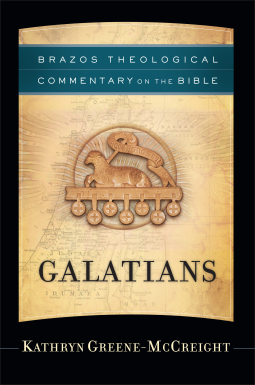
Galatians
by Kathryn Greene-McCreight
This title was previously available on NetGalley and is now archived.
Send NetGalley books directly to your Kindle or Kindle app
1
To read on a Kindle or Kindle app, please add kindle@netgalley.com as an approved email address to receive files in your Amazon account. Click here for step-by-step instructions.
2
Also find your Kindle email address within your Amazon account, and enter it here.
Pub Date 25 Apr 2023 | Archive Date 9 May 2023
Baker Academic & Brazos Press | Brazos Press
Talking about this book? Use #Galatians #NetGalley. More hashtag tips!
Description
The Brazos Theological Commentary on the Bible enlists leading theologians to read and interpret scripture creedally for the twenty-first century, just as the church fathers, the Reformers, and other orthodox Christians did for their times and places.
A rich resource for preachers, teachers, students, and study groups, the BTC provides guidance for reading the Bible under the rule of faith. Each volume in the series includes
● a Christological focus and framework grounded in the Nicene Creed
● connections between biblical interpretation and today's social issues
● applications for contemporary faith and life
● devotional depth for meditation and reflection
● insights from literature, philosophy, culture, and more
In this addition to the series, respected theologian Kathryn Greene-McCreight offers a theological reading of Galatians.
Ultimately the Brazos Theological Commentary on the Bible demonstrates the continuing intellectual and practical viability of theological interpretation of the Bible.
Advance Praise
“Kathryn Greene-McCreight offers a fresh feminist reading of Galatians. Her engagement with a broad range of theological interpretation, both ancient and modern, is impressive. Here is a rich compendium of resources for the theological interpretation of Paul’s provocative letter.”—Susan Eastman, associate research professor of New Testament, Duke Divinity School
“Greene-McCreight adds a rich and important contribution to the Brazos series. The approach is linguistically careful, responsibly resourced by a range of Christian and Jewish scholarship, and steeped in the (especially patristic) tradition of the church. The result is pointed and provocative in fundamental ways. The volume reads Galatians not in the context of post-Reformation debates over justification but as a decidedly Pauline proclamation of Christ-centered promise that can speak especially into a present time of conflict and confusion over bodies and gender. Moving verse by verse, and occasionally expanding into small essays of detailed and luminescent analysis, the commentary scintillates with a liberative freshness.”—Ephraim Radner, professor of historical theology, Wycliffe College, University of Toronto
“This commentary makes it clear that Galatians is a pastoral letter primarily about an issue of fact, one which had implications for belief: the enforcement of circumcision on Gentile Christians. Greene-McCreight’s work is informed by recent biblical scholarship, not least by firsthand appreciation of J. Louis Martyn and his insights. The specificity of the issue Paul dealt with problematizes the drive to universalizability and inclusivity, whose message of liberation might have to be received in a register different from what we are used to these days. Accordingly, the exegesis is detailed, and close reading prevails over grand theorizing. It is also nicely informed by the wisdom of the interpretation of the Christian tradition.”—Mark W. Elliot, professor of biblical and historical theology, University of the Highlands and Islands; professorial fellow, Wycliffe College, Toronto
Available Editions
| EDITION | Other Format |
| ISBN | 9781587431449 |
| PRICE | $35.00 (USD) |
| PAGES | 224 |
Available on NetGalley
Average rating from 2 members
Featured Reviews
A commentary on Paul's Letter to the Galatians.
The Brazos Theological Commentary series tends to want to highlight various theological premises and particular contributions of a given text to our theological understanding. Greene-McCreight did not disappoint in this regard; she well highlighted the various ways in which Paul’s Letter to the Galatians thus contributed to our understanding of Paul’s perspective on theology and on theology in general.
In the epilogue Greene-McCreight grappled with how to best understand the relationship between the church and Israel in light of Galatians. One can tell how constrained she felt by Protestant mixing of covenants and an intense desire to stay as far away as possible from anything resembling supersessionism or “replacement theology”, coming up with the neologism “infrasessionism” to attempt to explain the situation. Her claim no Jewish people were part of the churches of Galatia seems a bit strong for the evidence, and thus her conclusion that Galatians says nothing about how Paul considered the relationship between Jewish Christians and the Law of Moses proves a bit baffling. Paul never declaimed his Judaism; but he did speak of how in Christ there is neither Jewish nor Gentile (Galatians 3:28), considered himself as having died to the Law and crucified with Christ (Galatians 2:20-21), and spoke at length regarding how “we” were under the paidagogos until faith in Christ came, after which the paidagogos no longer had any authority over him.
I understand the concerns regarding the ugly heritage of antisemitism in Christendom and how flippant many who uphold a form of supersessionism/replacement theology can prove. Yet as in all things religious, let alone Christianity, so much distortion and error derives from over-reactions to the bad doctrinal and practical views and actions of others. Yes, Paul did see points of continuity; he asked God to bring peace and mercy on the Israel of God, after all, and considered all who share in Abraham’s faith as children of Abraham. There’s no ground for Marcionism in Galatians. But the problem in Galatia were “Judaizers,” those attempting to impose circumcision and Jewish rituals on Gentile Christians, and those Christians were not to tolerate anything of the sort.
Nevertheless, a good resource while exploring Galatians.



